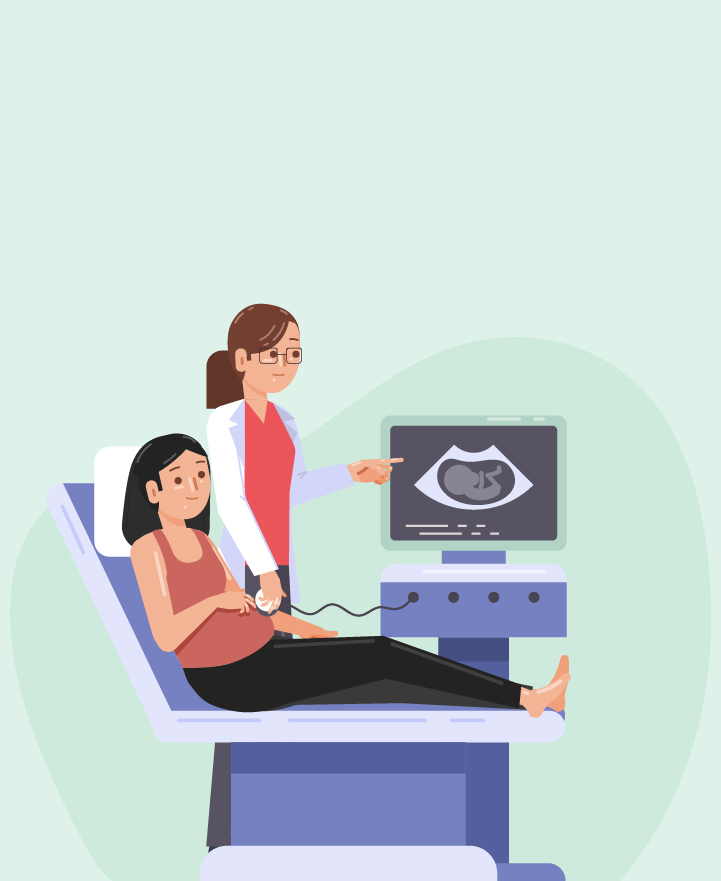

Why Should You Prioritise Antenatal Care? Find Out Here
Becoming a mother is one of the most exciting events in a woman’s life. Taking good care of yourself during 9 months of pregnancy is crucial for you and your baby’s health. Proper antenatal care administered by a qualified professional can also ward off complications or address them effectively. To know more about it, read on.
What is Antenatal care?
The care given to the mother-to-be during pregnancy is termed as antenatal care. This care includes monitoring growth of the baby and supporting and improving the health of the mother for safe delivery of the child. Many pregnancy complications come to light during the antenatal care procedures and early detection of such conditions can save the baby’s life. Examples of such conditions are:
• Pre-eclampsia
• Anaemia
• Hypertension
What to expect with antenatal care?
Normally, minimum 4 antenatal care visits are recommended for all mothers but it is advisable to go for at least 7-10 depending on doctor’s recommendation. First time mothers are usually asked to come in for more appointments. The four antenatal care visits are spread over the following stages of pregnancy while the other visits are interspersing them:
• 1st visit is to confirm pregnancy
• 2nd visit is in 2nd trimester
• 3rd visit is in 3rd trimester
• 4th and final visit is before the expected due date
At these visits, doctor checks for the following:
• Haemoglobin levels
• Blood pressure
• Weight check to verify expected weight gain as the pregnancy progresses
• Abdominal palpitation to check foetal growth
• Urine tests for albumin and protein
• Scans as required at specific stages to check foetal development and positioning
All of these may not be carried out at every appointment.
Apart from this:
• Doctor will give 2 doses of Tetanus toxoid or TT at different times, usually with a one-month gap.
• Iron & folic acid tablets are standard supplements given to all pregnant mothers. A combination of both is usually recommended to be taken daily after 4th month as these tablets ensure that the mother does not turn anaemic during the gestation period.
• Expect the doctor to monitor your weight and advice you to follow a balanced diet so as to help you to avoid gaining that excess weight. Generally, a good combination of protein, calcium, carbs, fats, vitamins and iron is recommended.
• Doctor will advise you to get enough rest and sleep.
• Advice on exercise regimen to follow at each stage of pregnancy is also an important aspect of antenatal care.
• Close to the expected due date the doctor will also talk about childbirth, what to expect, steps to be taken in case of any emergency, and what to do when the child is ready to be born. This helps to handle the stressful delivery event with relative ease and objectivity.
• As part of the antenatal care discussions, doctor also talks about the danger signs to watch out for so that one can immediately get to a hospital if they spot any of them.
Conclusion
Antenatal care is critical as it ensures that both the mother and child go through a safe and comfortable pregnancy. The periodic monitoring helps the doctor to take timely actions in cases where things aren’t going as expected. This way, antenatal care improves the success rate of pregnancies, especially for first-time mothers.
Sources:
https://nhm.gov.in/images/pdf/programmes/maternal-health/guidelines/sba_guidelines_for_skilled_attendance_at_birth.pdf
https://data.unicef.org/topic/maternal-health/antenatal-care/
https://www.nhs.uk/pregnancy/your-pregnancy-care/your-antenatal-care/
https://www.pregnancybirthbaby.org.au/antenatal-care-during-your-pregnancy
https://www.who.int/news/item/07-11-2016-new-guidelines-on-antenatal-care-for-a-positive-pregnancy-experience
https://www.who.int/publications/i/item/9789241549912
https://nhm.gov.in/images/pdf/programmes/maternal-health/guidelines/my_safe_motherhood_booklet_english.pdf
https://www.nice.org.uk/guidance/ng201/chapter/Recommendations#routine-antenatal-clinical-care
Disclaimer: This blog provides general information and discussions about health and related subjects. The information and other content provided in this blog, website or in any linked materials are not intended and should not be considered, or used as a substitute for, medical advice, diagnosis or treatment. Kindly contact your Doctor before starting a new medicine or health regime.
Related Articles
• Pregnancy Care Tips For Healthy Baby And Mom-To-Be
• Essential Precaution Tips To Be Taken During Pregnancy
• What Is High-Risk Pregnancy? Here’s Everything You Need To Know
Published on September 01, 2022

















 Health Insurance
Health Insurance  Travel Insurance
Travel Insurance  Car Insurance
Car Insurance  Cyber Insurance
Cyber Insurance  Critical Illness Insurance
Critical Illness Insurance
 Pet Insurance
Pet Insurance
 Bike/Two Wheeler Insurance
Bike/Two Wheeler Insurance  Home Insurance
Home Insurance  Third Party Vehicle Ins.
Third Party Vehicle Ins.  Tractor Insurance
Tractor Insurance  Goods Carrying Vehicle Ins.
Goods Carrying Vehicle Ins.  Passenger Carrying Vehicle Ins.
Passenger Carrying Vehicle Ins.  Compulsory Personal Accident Insurance
Compulsory Personal Accident Insurance  Travel Insurance
Travel Insurance  Rural
Rural